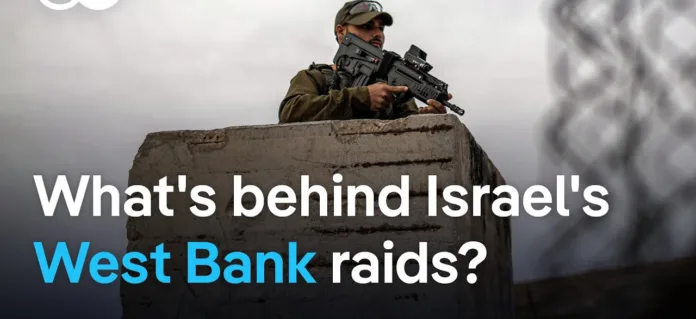Israel conducts its largest operation in the West Bank since 2002, deploying hundreds of soldiers and air force, leading to significant casualties
In a dramatic escalation of violence, Israel has launched a substantial ground and air attack on the northern part of the occupied West Bank, resulting in at least nine deaths. According to Palestinian health officials and local media, the attack, described by Israeli media as the most significant since 2002, has severely impacted multiple areas, including Tubas and Jenin.
The raid began early on Wednesday, targeting the Far’a refugee camp in Tubas. The Palestine Red Crescent Society reported that four people were killed and several others injured in this initial assault. However, efforts to assist the wounded have been hindered, as Israeli forces are reportedly blocking ambulances from entering the area.
The Israeli military’s operation also extended to Jenin, where two additional fatalities were reported by the Palestinian Health Ministry. In a separate incident, an Israeli drone strike targeted a vehicle in the village of Seir, killing three individuals.
Israeli media sources have indicated that this operation involved hundreds of soldiers and air force personnel, marking it as the largest since the Second Intifada in 2002. Channel 14 reported that the operation had been in the planning stages for several weeks.
Political analyst Omar Baddar has suggested that this aggressive action forms part of a broader Israeli strategy aimed at “ethnically cleansing” the West Bank. He highlighted that Israel has long pursued plans to annex and control large portions of the territory. Baddar also noted that the ongoing conflict in Gaza may have diverted global attention, allowing Israel to intensify its operations in the West Bank. Recent months have seen more than 650 Palestinians killed by Israeli soldiers and settlers in the West Bank, according to Baddar.
In response to the raids, Palestinian armed groups have engaged in fierce clashes with Israeli forces. The al-Quds Brigades claimed responsibility for targeting Israeli infantry with explosive devices in the Nur Shams camp. Similarly, the Qassam Brigades reported using locally-made explosives against Israeli military vehicles in Jenin and engaging in violent confrontations with the invaders.
Analysis:
Political:
The escalation in the West Bank represents a significant political development, both within Israel and internationally. For Israel, the operation underscores a hardline approach to security and territorial control, reflecting a broader political strategy that seeks to consolidate control over the West Bank. For the Palestinian leadership, the attack exacerbates the ongoing crisis and complicates efforts to negotiate peace or gain international support. The timing of the operation, amid global focus on Gaza, suggests a strategic manoeuvre to pursue aggressive policies in the West Bank while international attention is diverted.
Social:
The raid has profound social implications for the Palestinian population. The loss of life and injuries contribute to the mounting humanitarian crisis in the region. The blockade of medical assistance and the destruction of civilian infrastructure compound the social strain, affecting daily life and increasing the sense of insecurity and despair among Palestinians. The heightened violence also impacts the social fabric, fostering resentment and potentially fueling further conflict.
Racial:
The attack reflects broader issues related to racial and ethnic tensions in the region. The Israeli-Palestinian conflict is deeply intertwined with issues of racial and ethnic identity, with ongoing violence often perceived through the lens of racial and ethnic discrimination. The targeting of Palestinian communities and the destruction of their homes and infrastructure can be seen as part of a larger pattern of marginalization and oppression based on ethnic and national identities.
Gender:
While the immediate effects of the raid are not gender-specific, the broader impact of ongoing conflict disproportionately affects women and children. Women in conflict zones often bear the brunt of violence and displacement, and the destruction of homes and disruption of services exacerbate their vulnerability. The gendered impact of conflict includes increased rates of trauma and the strain of providing for families in a crisis situation.
Economic:
The Israeli raid has severe economic implications for the West Bank. The destruction of infrastructure and disruption of daily life contribute to economic instability and hinder development. The increased violence and military operations create an environment of uncertainty, deterring investment and exacerbating poverty. The economic strain is compounded by the blockade of aid and the destruction of economic resources, further deepening the humanitarian crisis.
